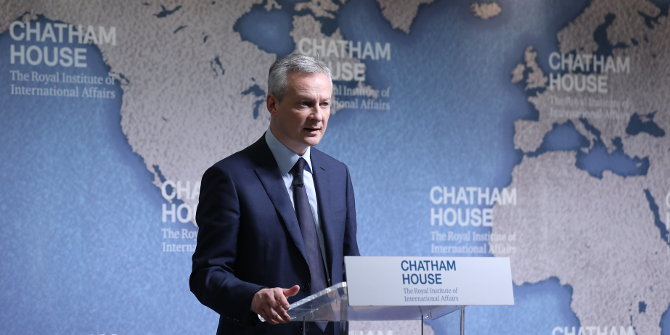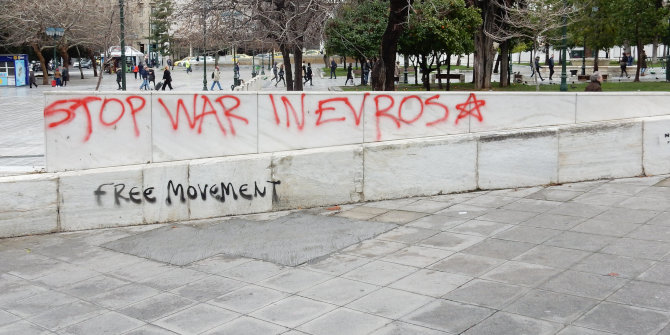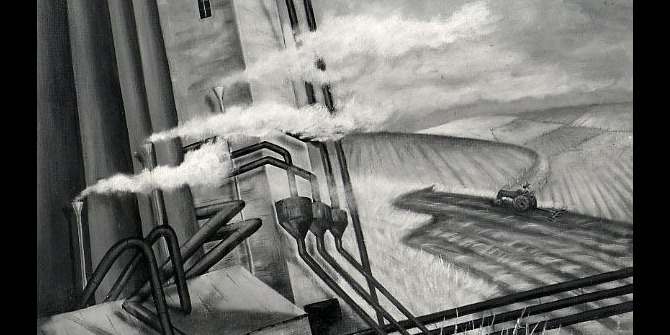In Le nouvel empire: L’Europe du vingt et unième siècle, Bruno Le Maire offers his take on the future of Europe. Published shortly before this week’s European Parliament elections, the book sets out a case for constructing European political unity not through the creation of a federal Europe, but over time, on the foundation of national sovereignties. Gijs de Vries finds it to be an easy read which is sensible, cogent and clearly written, but also a little disappointing.
Bruno Le Maire is one of Europe’s leading politicians. As France’s minister of finance and economics, he is responsible for delivering President Emmanuel Macron’s pledge to reform the French economy. In the Economic and Financial Affairs Council (ECOFIN), he is the leading advocate of a budget for the Euro area. Together with his German colleague, Peter Altmaier, he has just launched a major initiative to preserve Europe’s industrial ‘sovereignty’: a public-private partnership to keep the European car industry from being dependent on Chinese electrical batteries.
Bruno Le Maire also writes books. Lots of books, in fact. In 2008 he published Des hommes d’État, an inside view of the infighting between Nicolas Sarkozy and the chiraquiens, which he had witnessed at first hand as the head of cabinet of then prime minister Dominique de Villepin. In Jours de pouvoir (2013), he looked back on his experience as minister of agriculture. But Le Maire, who studied French literature and who speaks fluent German and English, does not like to restrict himself to politics. He also wrote a fictional biography of the great German conductor Carlos Kleiber (1930-2003). Earlier this year, and to considerable public acclaim, he published a moving testimony to a friend who had died of brain cancer.
In his latest book – his eleventh – Le Maire turns his attention to the future of Europe. The timing of its publication, shortly before the European elections due to be held between 23 and 26 May, is obviously deliberate: this is a book that aims to convince, not merely to entertain. Le nouvel empire is an easy read: sensible, cogent and clearly written. It is also a little disappointing.

Bruno Le Maire, Credit: Chatham House (CC BY 2.0)
Le Maire’s starting point, interestingly, is Brexit. On 23 June 2016, he writes, a dogma fell: we now know that European integration is not irreversible. Le Maire thinks that the Dutch and French referenda on the constitutional treaty should have been read as warning signs. But Europe’s leaders pushed through the treaty after some cosmetic changes instead of addressing people’s concerns. Public support for the EU suffered further blows as a result of the financial crisis (2008) and the migration crisis (2015). With Brexit, for the first time since 1957, there now is an alternative to European integration: the European Union’s disintegration.
Europe’s travails are compounded by changes in the transatlantic relationship and the rise of China. In Le Maire’s view, John Bolton’s promotion to national security adviser does not portend well. He recalls visiting Bolton in 2002. On his desk Bolton had positioned a bronze model of a colt, next to a hand grenade (‘une grenade dégoupillée’, a grenade with its safety pin removed – probably a slip of the pen, as the author lived to tell the tale). Today, under President Trump, the United States seeks to weaken Europe by dividing it. China, meanwhile, hones its strength. Europe’s only strategically equivalent answer to these developments, Le Maire argues, is to construct its political unity. This does not mean creating a federal Europe. European sovereignty must be constructed, over time, on the foundation of national sovereignties. Above all, it must be imagined and willed, against the sceptical spirit of the day.
European sovereignty is most urgently needed in fiscal policy. The book takes on a sharper edge when Le Maire mentions the hours of ‘sterile discussions’ with his Dutch colleague Wopke Hoekstra about a budget for the Euro area. If the Euro area does not consolidate, he writes, if national economic divergence does not decrease and if the Euro does not become an instrument of international power, the Euro area will implode. Meanwhile countries like Italy should respect the rules for deficits and debt in the Euro area. If there is an argument for changing the rules, which Le Maire does not exclude, EU governments should do so together. What they cannot do is create a stable Euro while undermining its foundations – ‘and that applies to France, too’.
But more is needed. European sovereignty also requires more public support for innovative industrial champions (and less stringent competition rules); more European solidarity, including through a European unemployment insurance mechanism; fighting tax evasion by global technology companies; better border protection; combating climate change; and reflection on our European cultural identity.
Well, yes. Le Maire’s arguments make sense, and his case is stated eloquently, but much of what he writes has been said before. Each of these proposals carefully reflects current French policy, as set out by President Macron. It is not until the final chapters of the book that the author hits his stride. This is when he directly addresses his French readers.
In 1995, in Srebrenica, Bosnian Serb forces under General Ratko Mladić murdered 8,000 Bosnian Muslims. In 1995, Le Maire writes, Europe demonstrated cowardice, renunciation and a fear of fighting. It took a counter-attack in Sarajevo, where two French officers lost their lives, for French honour to be restored. The officers died, in the words of President Jacques Chirac, for a certain idea of France, ‘a France that refuses to yield to fatalism and irresponsibility’. For Le Maire, to hear nationalism resonate in France, as it does today, is a betrayal of what France stands for as a nation.
Le Maire sees this nationalism (‘la France peut avoir son Nigel Farage’) as rooted in the changing equilibrium with Germany post-1989. The French, to whom Europe has been presented as an extension of French power, feel control slipping away from them. But Europe will not be a greater France; it will be Europe, where France can be great.
To preserve its influence, Le Maire argues, France should reach out to other European countries beyond Germany. France-German cooperation is necessary but not sufficient. France needs to build bridges to Poland, and other countries to its East. It is an argument that has yet to conquer Paris.
What, finally, of the book’s intriguing title: Europe as empire, a notion famously developed by Jan Zielonka to characterise Europe’s evolving political and social development? Le Maire saves this question until last, but gives it short thrift. European states, he says, face a choice: either band together, or lose your place in the world. Empire or archipelago: the choice is ours. And with that, the book fizzles out.
Of course, this no academic treatise: it is a political act. With this book Le Maire positions himself as a committed European in an increasingly Eurosceptic country. As a former Gaullist, he demonstrates firm support for Emmanuel Macron’s European agenda. That mix of conviction, courage and loyalty could make him an excellent candidate to succeed Pierre Moscovici as the French member of the European Commission. Or perhaps even to climb to what Benjamin Disraeli called the top of the greasy pole, as prime minister, should the incumbent’s luck run out.
Bruno Le Maire: watch the man. But buy his next book.
Please read our comments policy before commenting.
Note: This article gives the views of the author, not the position of EUROPP – European Politics and Policy or the London School of Economics.
_________________________________
Gijs de Vries – LSE
Gijs de Vries is a Visiting Senior Fellow at LSE and former State Secretary of The Netherlands.





